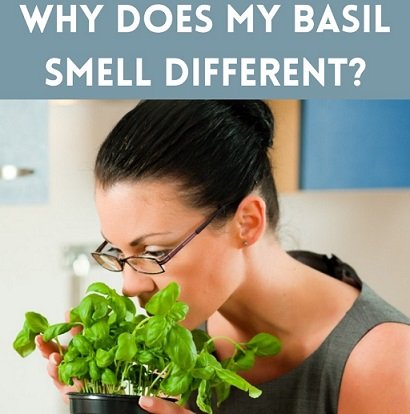Basil is a sweet-smelling herb used in a lot of recipes around the world.
However, there are a lot of complaints that sometimes the basil smells different, and not in a good way. Basil has been known to smell like licorice, anise, cinnamon, lemon, or even cat urine.
Why does my basil smell like cat urine?
This is actually because some varieties of basil contain the presence of mercaptan compounds, compounds that are also found in cat urine.
Some enzymes are known to break down the mercaptan compounds that are present in basil. When they are broken down, they produce carbon dioxide, ammonia, and some other mercaptan compounds that are rich in sulfur.
The ammonia and sulfur-rich compounds are responsible for the distinct smell of cat urine in basil.
This compound is present in a few other plants as well. It can also be found in flatulence, bad breath, and Sauv Blanc wine.
Other reasons why your basil smells like Cat urine –
a. Type of Basil – Boxwood
This variety of basil reportedly grown in France is said to smell strongly of cat urine. Boxwood basil indeed looks like a box with its symmetrical shape. This variety of basil has tiny leaves and a very strong odor.
b. Cat urine
Another reason for your basil smelling like cat urine could be that a cat is actually urinating on your plant. It might be a real possibility if you have a pet cat or any cats around the house.
To know for sure, check if the soil around your plants has been disrupted. If it has, then it is most probably a cat. Make sure that you wear gloves while inspecting the soil since there is a strong chance of finding feces on the soil too.
How to get rid of the cat urine smell?
If your basil naturally smells like cat urine, then the most possible problem is a genetic one. In this case, there is not much to do. Gardeners recommend pruning your plant often or cutting off its flowers to reduce or remove the smell.
If the reason for your plant smelling like cat urine is because a cat has urinated there, you need to proceed carefully. If you find cat urine or feces near your plant, it is likely that the cat is using your basil plant as a litter box.
Water the soil under the plant to make sure the ammonia is dissolved in the soil.
If this is the case, then you cannot consume the basil in any way. Cat urine and feces could be on the plant even if it is not visible, and can cause serious trouble.
Why does my basil smell like licorice?
The smell of licorice comes from a chemical compound called anethole, which is also present in anise. It is also found in fennel.
Anethole is present in some varieties of basil, giving it a distinct smell and flavor. It is often described as similar to licorice or anise.
Licorice basil:
Licorice basil is also known as anise basil or Persian basil. It has silvery leaves and a spicy licorice flavor that comes from the compound anethole present in anise. ‘
Thai basil is also sometimes called licorice basil, because of its anise and licorice-like smell and taste.
Thai basil, licorice basil, and anise basil are three different varieties of basil with some similar characteristics. They have purple stems and leaves.
They grow up to 12 to 18 inches tall with leaves about 1 to 2 inches small. All three are similar in taste and smell.
Why does my basil smell like lemon?
There are certain varieties of basil that smell of lemon, or citrus. This lemon smell is the result of a chemical compound called Citral that is present in some basil varieties.
The compound citral is made of neral and geranium and produces this distinct lemony scent that is pleasant to smell.
Citral is found in many plants such as the common lemon, lemongrass, lemon cypress, and lemon verbena. A lot of the plants which have this chemical compound present in them have a yellowish tinge on their leaves or stems.
Lemon Basil: Lemon basil (Ocimum x africanum) is also known as Thai Lemon, Lao, or hoary basil. It is a crossbreed of American basil (Ocimum americanum) and regular basil (ocimum basilicum).
Lemon basil contains citral and limonene, which makes it smell and taste lemony and slightly sweeter.
The sub-varieties of lemon basil are prominently known for their strong smell and taste of lemon. Lemon basil is available all over the world but is prominent in Asia and the Middle East.
Lime basil is also very similar to lemon basil. Another variety, the Thai lemon basil, has a citrus odor and a distinct lemon flavor.
Why does my basil smell like cinnamon?
Basil can often smell like cinnamon. That is because of a certain chemical compound named methyl cinnamate, which is found in some varieties of basil.
Methyl cinnamate is a white or transparent solid substance that has a strong aroma which is the smell of cinnamon. It can also be found in peppers, strawberries, and other spices used in the culinary world.
Mexican Spice Basil: Mexican spice basil is also known as Cinnamon basil. It is either a separate cultivar or a cultivar of spice basil. It has purplish stems like Thai basil, but its flowers are pink or purple and its leaves are longer.
Why does my basil smell sharp and bitter?
Often, when herbs are young plants, their smell is on the sweeter side. As they grow and mature, the smell can change from sweet to more sharp, bitter, or pungent.
Basil is used for its aromatic and sweet-smelling and sweet-tasting leaves. They are high in essential oils and add a lot of flavor to a variety of dishes across multiple cuisines.
However, this mild and sweet-tasting herb can also get bitter to smell and taste as it matures.
The basil is an annual plant that starts flowering and once it completes its life cycle, it dies at the end of the year. When it does start to bloom, all the energy is focused on the flowers, which makes the leaves turn bitter.
As it reaches the end of its life cycle, the stems also turn woody, giving it a bit of a sharp smell.
It is also possible that the variety of basil that you have is bitter in flavor.
Solution
Pruning: You can lengthen the life of your basil by pruning it often and cutting off the flowers before they have a chance to bloom. This will ensure that your leaves do not turn bitter.
What can you do?
Many supermarkets and big shops often mislabel their plants. It is possible to buy a basil plant that is a completely different variety than the one you want.
The basil is cross-pollinated very easily. With over 60 varieties of basil, it can often create a problem regarding the identity of the basil and its exact variety and sub-variety.
In such cases, it is better to get seeds from a well-known local seed vendor, rather than getting a plant from the supermarket.
Basil is easy to grow, so starting the plant from seed yourself is the better option if you are not sure about getting the exact variety of basil that you want.
Tip – If you do buy it as a plant, crush a leaf and sample the taste and smell. You will easily know whether or not you want that variety of basil.
Thai basil or a lot of Asian varieties of basil are strong on the anise flavor. Sweet basil or Italian basil is a better type of basil if you are looking to make more pesto and pizza.
Why do the smells of basil vary?
Basil varies so vastly in its smells, taste, and appearance because of the diverse nature of the genus Ocimum. Basil is a plant that is easily cross-bred with different varieties which produces even more hybrids.
The plant varieties that are specially bred so that they have the desired properties are known as cultivars.
Basil has a vast variety of cultivars because of the versatility of this plant to cross-breed. This makes it possible to create varieties that are practically tailor-made to have a specific smell, taste, and flavor to it through selective breeding.
Cross-breeding basil
Basil is very easy to cross-breed. Because of its very tiny seeds, the basil plant can pollinate easily with a plant growing in the vicinity.
Basil is also self-pollinating. This means that it can pollinate itself, without the need for another plant to fertilize it.
To cross-breed basil without doing a lot, the easiest way is to plant two different varieties next to each other. When they are both flowering, the wind will do its job of carrying the pollen from one plant to the other.
However, it is not a very sure way of getting a cross-bred plant, as the basil can self-pollinate itself.
To be more sure that you are creating a hybrid, clip off a stamen that is rich with pollen from one basil plant and rub it on the stigma of the other plant.


